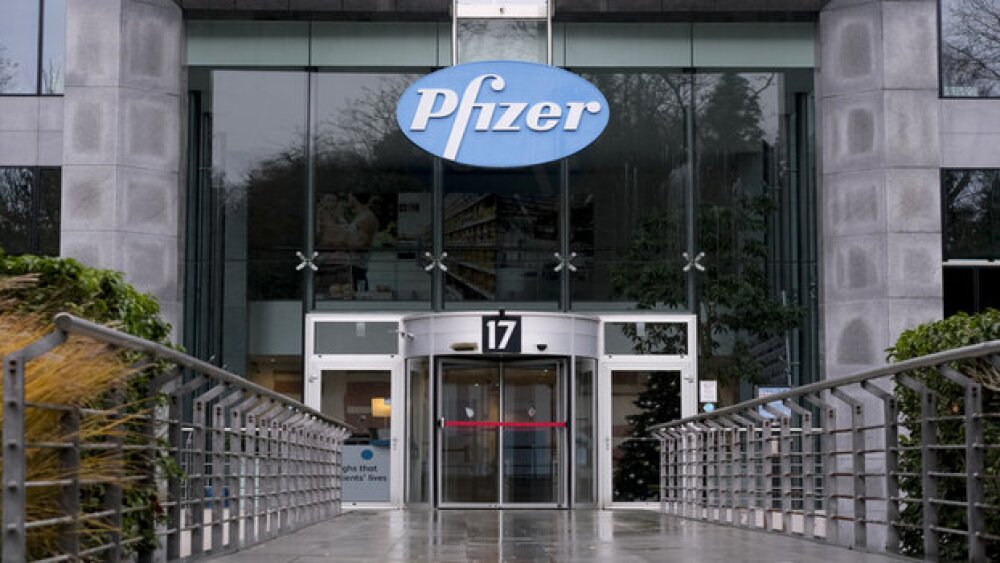Patients treated with the investigational sickle cell therapy saw an increase in hemoglobin levels and improved red blood cell parameters.
Pictured: Exterior view of Pfizer’s office in Belgium/iStock, Alexandros Michailidis
Gene therapies, while transformative, aren’t the only medicines in development for sickle cell disease. During the 2023 Annual Meeting & Exposition of the American Society of Hematology (ASH) this weekend, Pfizer presented preliminary Phase II/III findings showing that its investigational SCD treatment, GBT601, also known as GBT021601, could elicit a robust increase in hemoglobin levels.
SCD is caused by a mutation in the genes involved in producing hemoglobin beta, an iron-rich compound found in red blood cells (RBC). This results in some RBC being shaped like “sickles” and becoming sticky, slowing or blocking blood flow while leading to anemia and episodes of extreme pain, sometimes called vaso-occlusive events (VOE) or vaso-occlusive crises (VOC).
GBT601 is a next-generation polymerization inhibitor of sickle hemoglobin (HbS). It works by boosting the affinity of HbS to oxygen and prevents the sickling of RBCs in the bloodstream.
The data presented at ASH come from 35 patients enrolled in the first part of a three-part, multicenter study, most of whom had completed at least 12 weeks of treatment. Seventeen patients received a 100-mg dose of the study drug, which was given at a twice-daily loading dose for four days, followed by once-daily administrations thereafter. The remaining participants were given 150 mgs of GBT601.
After 12 weeks, patients treated with the 100-mg dose saw a mean hemoglobin increase of 2.67 g/dL, while counterparts in the 150-mg dose arm averaged an increase of 3.17 g/dL. Researchers also documented a “favorable trend towards reduction from baseline” in terms of hemolysis indicators.
Treatment with GBT601 led to a drop in adherent cells, which according to the researchers could correlate with a similar decline in the probability of VOE.
In the 27 patients with at least one VOC at baseline, the annualized VOC rate dropped from 2.30 at baseline to 1.16 while on the study drug.
Another poster from the same study, also presented at ASH, showed that GBT601 induced improvements in several red blood cell (RBC) parameters at 6 and 12 weeks, including hematocrit, mean corpuscular volume and RBC count.
As for safety, most treatment-emergent adverse events were grade 1 and 2 in severity, and the majority were deemed unrelated to the study treatment. Overall, eight patients developed treatment-related side effects, including diarrhea, abdominal discomfort and headache. One episode of sickle cell anemia with crisis that was found to be related to GBT021601.
One patient dropped out of the study and another died—the cause of death was a cerebrovascular event—though both incidents were not related to the study treatment, according to the researchers.
Pfizer is positioning GBT601 as the successor to its own Oxbryta (voxelotor), an HbS polymerization inhibitor that won the FDA’s approval for SCD in November 2019.
GBT601 and Oxbryta were originally discovered and developed by California-based Global Blood Therapeutics, which Pfizer bought in August 2022 for $5.4 billion.
Saturday’s readout for GBT601 followed two landmark approvals that shook up the SCD space. In a one-two punch Friday that stole the show before ASH officially began, the FDA approved Vertex Pharmaceuticals and CRISPR Therapeutics’ gene-edited treatment Casgevy (exagamglogene autotemcel) and bluebird bio’s lentiviral gene therapy Lyfgenia (lovotibeglogene autotemcel).
Tristan Manalac is an independent science writer based in Metro Manila, Philippines. He can be reached at tristan@tristanmanalac.com or tristan.manalac@biospace.com.






